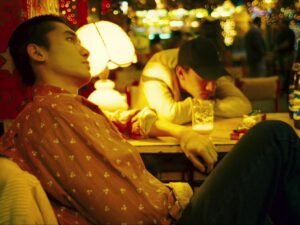The following article contains heavy spoilers as it is not just a review, but a collection of my thoughts on the film. If the reader has never watched the movie, I’d suggest you do so first.
There is a perverse enjoyment in watching a Wong Kar-wai film. It is a feeling of loneliness, a longing for something that you never lost in the first place. But this element of lost love is ever present in his spectacular array of work. Be it the forbidden love of Mr. and Mrs. Chan in In the Mood For Love or Takeshi Kaneshiro’s desire for warmth in Chungking Express. Every Wong Kar-wai film revolves around this concept of love. I dont think it is a coincidence that Wong Kar-wai is a self-proclaimed John Cassavettes fan, who himself stated that he is “only interested in love.”
Happy Together (1997), takes the same concept as many other Wong Kar-wai films, lifts them from their predominantly Hong Kong setting, and takes the story to Buenos Aires, Argentina. And another significant change, is that the two main protagonists are gay.
But the footprints of Wong Kar-wai are omnipresent throughout the film as it is in his filmography. The use of pop music, the jarring edits, the close ups, the monologues, and the undeniable genius of Christopher Doyle behind the camera.
The story revolves around two troubled lovers named Lai-Yiu Fai and Ho Po-wing (portrayed incredibly by Tony Leung Chiu Wai and Leslie Cheung respectively). They live in Buenos Aires, Argentina and have a long history of break ups and eventual patch ups. One of these longings to rekindle their relationship leads them to leave Hong Kong, and eventually end up in Argentina.
The couple’s latest fling, another futile attempt of being together is shown to us, the audience, as we understand the cracks in the facade of this so called relationship. We get to know Fai (the main narrator of the story), as we view most of the film through his perspective. We see his violent side, and his soft compassionate side. We also get to know Po, and how he plays the manipulator in the relationship causing rift and reunion between the two at his will.
Even after all the fights and arguments these two go through, it is clear that it is very difficult for them to live without one another. After every single break up or fight, they feel lost, morose, completely out of place in a foreign country. Their loneliness drives them to prostitution, trying to fill the holes in their identities, eventually always ending up with one another. We see this cycle of hurt spinning, as we wonder if both these characters would once again enter the recursive world of self harm, after their latest fling. That is until, the third pivotal character of the story shows up, Chang.
Since his very first scene, Chang has been portrayed as someone who listens very attentively to things around him. He strikes up a friendship with Fai at a restaurant kitchen they both worked at. When we watch the latest break up between Po and Fai, we are led to believe that both would return to their default mode of self loathing and depression, but Fai is saved from this. Chang becomes a trusted friend of Fai as they revel in their company. Chang, as it turns out, had a defect in his eyes as a young boy, enabling him to be a sharp listener. He is a traveller though, and must leave once he saves up enough money to continue his journey.
Chang and Fai’s farewell is probably the most quietly heart wrenching scene I’ve ever come across. But even as Chang leaves, he does so by instilling a renewed outlook towards life in Fai. Fai continues his journey to search for a waterfall that Po and him were meant to visit somewhere in Argentina. Eventually Fai finds the place, standing on the cliff, all alone soaking in its beauty, and still longing for Po’s presence. Po, on the other hand, tries to find Fai, to get back with him. Only to find, this time Fai was gone for good, never to return.
We are treated to a contrasting image of Po, deep in despair, and the movie ends with Fai back in Hong Kong moving on with his life. In Hong Kong, Fai tracks down Chang’s family food stall and slips a photo of Chang into his pocket, as a memoir of his time with him.
The english title of the film is antithetical to the story itself as both Po and Fai are rarely happy together, but couldn’t find joy in life apart from each other either. The role of Buenos Aires in this film is an important one, as it was one of the first major cities in the world with an active scene among the LGBT community. It was a lot more progressive back in the 90s especially when compared to Hong Kong.
Telling this story of a volatile gay couple, in Buenos Aires, ensures that Wong Kar Wai can focus solely on the relationship rather than the social taboos associated with it. And I think this is what many directors part of the New Queer Cinema movement (Todd Haynes, Gus Van Sant etc.) tried to achieve. Because there is more to explore in a same sex relationship, than just the public perception towards it.
Happy Together never aspires to make any political statement, at least not overtly. All Wong Kar Wai did with this film is what he has done well over his career. Weave a story around the three Ls. Love, Loss and Longing.

